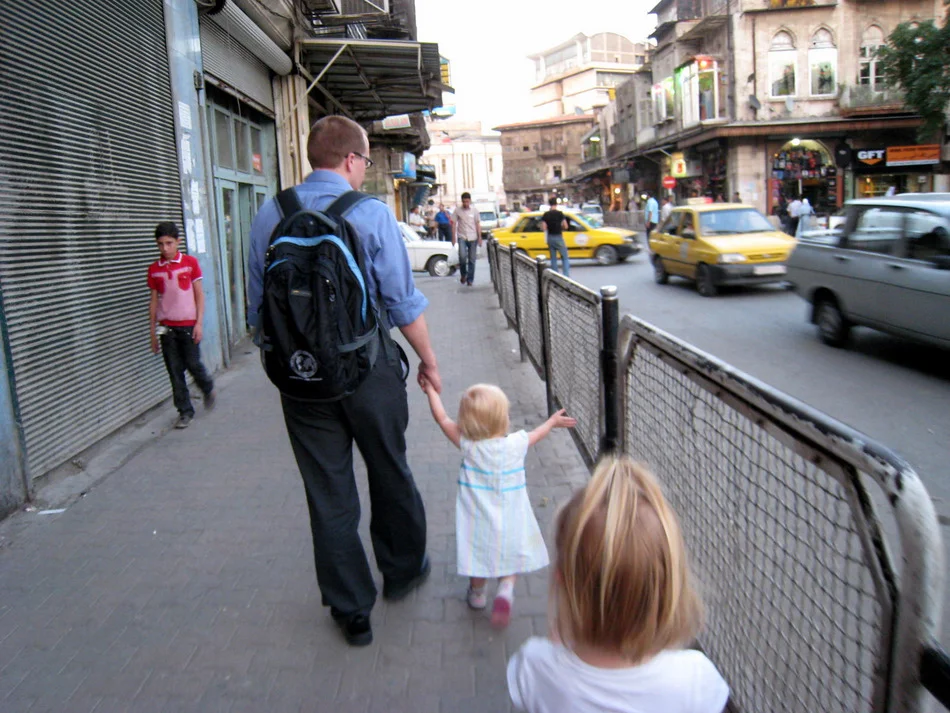Honoring Aleppo through memories
Sometimes it seems like I've written it all before, but just in case: let's mourn Aleppo.
You could buy fresh flatbread in Aleppo by the clock tower, straight off the sidewalk railing. A bakery there used to hang its hot bread there to cool.
A water salesman in Aleppo near the Al-Jdeide quarter.
All along that main road and around the corner, there was ice cream for sale. I bought a strawberry ice cream cone once as a treat and it tasted like cockroach killer. I have wondered in the years since if they had cleaned the machine or bin with bug spray and then not rinsed it enough. The man who sold it to me was so happy about giving me an ice cream cone (I'm sure he didn't know about the bad taste) that I couldn't bear to even make a face in front of him. So after we stepped away from the kiosk, I found a restaurant nearby and asked to use their bathroom and then spit the ice cream out in the trash can. See? Aleppo is a real place and not all these memories are rosy. Sometimes ice cream tastes like cockroach spray. (But it is served to you with a smile.)
Image via.
Jeremy and I have been inside the Baron Hotel, where people like TE Lawrence and Agatha Christie used to stay (among others). The hotel was positively bursting with history, but not so much with comfort. In other words, it was probably practically unchanged from the level of facilities offered to travelers 100 years ago.
When Jeremy and I bought tickets for an overnight train ride from Aleppo to Damascus, the train station clerk asked to see our marriage license before he would let us share a sleeping compartment. Aleppo in general always seemed more religiously conservative than Damascus - more women wore the veil there. Before we got on the train, we walked all through a huge public park near Osman Pasah street.
In the spring of 2004 when I was so pregnant sick, we went to a restaurant (Bazar al-Charqa, a restaurant that seemed to be carved out of rock and looked like an ancient marketplace - really beautiful) and I ordered lentil soup and they didn't have any and I cried. This happened more than once during my pregnancy with Miriam (literally crying for lack of lentil soup in a restaurant in Syria) but one of the times was there in Aleppo.
When we were in Aleppo for a few days in the summer of 2010 with the girls, we stayed at a hotel where we had a choice of a room with its own bathroom but no AC, or a room with AC but a shared bathroom. We went for the AC/shared bathroom. I have no regrets. Hotels in Aleppo (unless you went for the Sheraton or Four Seasons) were either converted apartment blocks (like you see above, and that explains the often shared bathrooms) or converted courtyard homes (like Dar Zamaria, mentioned below). The converted apartment block hotels near the center were inexplicably right in the middle of what we affectionately called "the tire district." It makes you wrinkle your nose a bit, but then also smile because you're right there in the middle of everything instead of sequestered in a posh hotel.
On that same trip, Miriam got to feeling crafty: "sometimes my body just needs to color." So we walked over to al-Jabri Square and bought her some colored pencils and a dinosaur coloring book.
Aleppo is the city that took in Armenian Mormons when no one else wanted them. It's where two Mormon missionaries are buried, in an Armenian cemetery. It's where a few members of the church call home, and where a baby was born and blessed in 2009 or so.
One of our favorite hotels was in Aleppo (I say was because I know for a fact it has since been destroyed): Dar Zamaria. This was one of the converted courtyard homes. It felt like sleeping in an old stone palace.
One of our favorite restaurants was in Aleppo: Beit Wakil. Their specialty was meat kebabs with cherry sauce.
At the Citadel in Aleppo, which was used for war hundreds of years ago and then again in recent years.
Aleppo was hotter and drier and brighter than Damascus. It's Syria's "second city" but it is huge. Damascus had its international flavor (like there was even an Indian restaurant there!), but in Aleppo you could see Armenian and Russian written on advertisements and shop awnings. Damascus was old religion with its Street Called Straight and Mohammed on the mountain; Aleppo was new trade - Christie and Lawrence and Lindbergh and caravans. In the history books, you always read about this area of the world being such a hotspot for international travel and research and commerce and in Aleppo, you could feel that.
I don't write this post to make Aleppo about me, though I think that's a natural impulse and often an admirable one - a way for us to process faraway events and see how they fit in our life's narrative. I write this and show these pictures to honor that city and keep it in my thoughts during its time of need.
This statue of Hafez al-Assad greets you as you drive into the city.
More posts about Aleppo: the burning of the souq, a video of the city as it was, and happy kids in Aleppo.
















